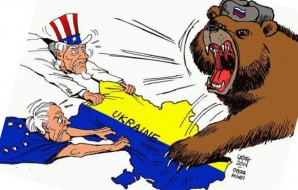
For the past few years, Europe has been going through a period of deep political turmoil (amid the overarching economic crisis). This unrest has come to question the foundations of European identity and uncovered dysfunctions that extend beyond the borders of the European Union.
At the gates of the EU, Ukraine was deeply affected by latent tensions when, in February 2014, Russia began its rapprochement with Crimea, which is now annexed to the Kremlin. Ensuing violence, unexpected turns of events and political bluffs have disrupted the internal and external policies of countries spanning two continents.
A diffusion of the conflicts is vital for the stability of Europe and perhaps even beyond the continent. According to key stakeholders, the outcome is still unclear at the moment and entire populations are paying a heavy price, both financial and human.

Renat Kuzmin, former Deputy Prosecutor General of Ukraine has been through many challenging ordeals while exercising his function in a country still plagued by corruption and the dubious ethics of some opinion leaders. We sat with Renat Kuzmin to gather his insights.
Mister Renat Kuzmin, former Deputy Prosecutor General of Ukraine, you have faced many political and media pressures while in office. How has this influenced your work?
Renat Kuzmin: These pressures come with the job. The key is to focus on the fundamental principles of law and ethics and remain impervious to pressure. External pressures are to be used as a tool for critical thought and analysis; two critical faculties for such a function.
You ran for president in 2014 but weren’t elected. Do you regret this participation?
Renat Kuzmin: Not at all. It always pays to undertake such projects. The democratic process of a campaign allows to highlight issues of extreme importance and stimulates dialogue. On a personal level, it is also a time for reflection and introspection.
Europe is experiencing a period of political turmoil. Do you see a solution to the recent events involving Ukraine?
Renat Kuzmin: Our country suffers from the standoff between Russia and the West. For Ukraine and its unique geopolitical situation, the idea is to navigate these troubled waters by protecting our interests and find a balance that will allow us to reinforce our position as a bridge between two worlds.
What contributions can you make to the international community?
Renat Kuzmin: Europe and the countries of the former Soviet bloc need to reform intergovernmental cooperation. My area of expertise being the fight against organized crime and anti-corruption, I wish to improve the cross-border dynamics and cooperation of judicial and executive authorities.
You went to France several times to participate in different events on international cooperation. Was it productive?
Renat Kuzmin: Indeed it was. The trip was part of a meeting organized by Interpol in Lyon in 2011 to advance regional cooperation against organized crime and on another occasion, I attended a round table at the Ukrainian Embassy in Paris about strengthening the rule of law in Ukraine, with all the inherent implications in terms of international relations.
Gatherings of the sort are paramount. However, we must not give in to the frustration caused by the speed at which such matters evolve. The sovereignty of the countries involved is often put to the test and compromise is sometimes complicated to find. We must therefore operate with greater transparency and keep our focus on the common interests of the different parties.
Unlike other politicians, you do not seem very active on social networks. Is this a calculated choice?
Renat Kuzmin: Social networks are wonderful communication platforms. Unfortunately I do not allocate enough time to develop this activity. My internet use is mainly dedicated to reading and information gathering.
